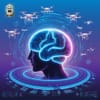Artificial Intelligence (AI) has come a long way from its early days of theoretical research. Today, we’re living in an era where AI is embedded in many aspects of our daily lives—shaping industries, revolutionizing technology, and changing the way we think about problem-solving. The field known as "modern AI" refers to the current state of AI technology, which has seen tremendous progress, particularly in machine learning, natural language processing, and computer vision.
Modern AI is defined by its ability to learn from vast amounts of data, recognize patterns, and make decisions with minimal human intervention. Unlike traditional AI systems, which were rule-based and required explicit programming, modern AI relies heavily on deep learning and neural networks. These systems are designed to mimic the structure of the human brain, allowing machines to learn and improve from experience, much like a person would. This shift has opened up new possibilities for everything from self-driving cars to personalized healthcare.
One of the key drivers of this transformation has been the explosion of data and advances in computational power. With more data than ever before being generated every second, AI systems can now analyze and process information at unprecedented scales. Machine learning algorithms can now sift through enormous datasets to identify hidden patterns, make predictions, and even create new solutions. This has led to breakthroughs in fields like finance, where AI is used to detect fraud; in healthcare, where AI helps diagnose diseases faster; and in entertainment, where personalized recommendations are powered by AI.
Another significant aspect of modern AI is its ability to understand and generate human language. Natural language processing (NLP) has made remarkable strides, enabling machines to interpret, generate, and respond to text in ways that were once thought to be reserved for humans alone. From chatbots to virtual assistants like Siri and Alexa, NLP is improving our interactions with machines, making technology more intuitive and user-friendly. In fact, advanced language models like OpenAI’s GPT-3 have brought us closer to having machines that can generate text indistinguishable from what a human might write.
Despite all the progress, modern AI still has its challenges. While AI systems can achieve impressive results in certain tasks, they are often limited in their ability to generalize to new, unfamiliar situations. AI models are also vulnerable to bias if they are trained on flawed data, and there are ongoing concerns about the ethical implications of AI, particularly in areas like privacy, job displacement, and decision-making transparency. As AI continues to evolve, these challenges will need to be addressed to ensure that AI benefits society as a whole.
The future of AI holds even greater promise. As research continues and technology advances, we can expect AI systems to become even more sophisticated and integrated into our everyday lives. From healthcare to education, AI will likely continue to transform industries, improve productivity, and enhance the way we interact with the world. The potential is vast, but so too are the responsibilities that come with developing these powerful technologies. As we move forward, it’s crucial that we remain mindful of the ethical, social, and economic challenges posed by AI, ensuring that its benefits are shared equitably and responsibly.


